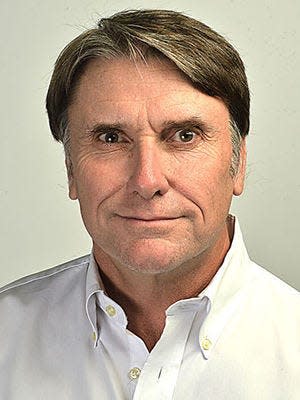Putin and Xi: When you're a dictator, it's tough to admit it when you're wrong
- Oops!Something went wrong.Please try again later.
How desperate must a world leader have to be to go crawling on your hands and knees to Kim Jong-un?
If you are any kind of self-respecting nation, what can North Korea have that you could possibly want?
Those who fear the Ukrainian counter-offensive is not going as swimmingly as hoped might consider the alternative. Vladimir Putin once fancied himself the equal of Charlemagne and Alexander the Great. Now he’s bumming spare change off Asia’s James Buchanan.

You didn’t have to be an expert reader of body language to get the photo. Looking like a bathroom break at funeral director school, a somber, black-suited delegation of Russians and North Koreans stiffly paraded for the cameras, Putin looking like he’d rather be at the Ukrainian front, and Kim trying unsuccessfully not to look a ninth-grade girl who had just scored a date with the senior pulling guard.
But no matter how embarrassing and degrading this whole trampoline act was to the self-anointed Great and Powerful Putin, he had to go through with it. Russia needs anything that will in any way explode, and ole Potato Head has been starving his people to buy munitions of dubious quality. So hey, it’s worth a shot.
Putin plied Kim’s porcine maw with fine beef, crab and sturgeon before boxing back in his 37-mph-top-speed railcar and waving goodbye, and then trying to erase the whole thing from his memory.
Prigoshyn, rest his soul (if any), made Putin look somewhat weak. But having to get down on his knees and beg for help from the bat-dung crazy leader of, like, the 180th most important country on earth? Ouch. This is not the behavior of a stable nation.
On Russia’s southern border, President Xi must be thanking his lucky Chinese stars that the world was, at least briefly, fixated on Russia to divert attention from his own crumbling situation.
Xi and China are a long way from having to go hat in hand to a country with the GDP of a lemonade stand. But the situation isn’t good. China, which has never quite gotten the hang of this capitalism thing, might even wish for Russia’s more primitive economy — made up mostly of oil, metals and timber.
In 2008, like the rest of the world, China was feeling the effects of the global recession. And, playing it by the book, the government spent heavily to stimulate the economy. Prohibitions against government borrowing were skirted by creating “financial vehicles” that bought, on credit, all kinds of really cool trains, towers and industrial parks, some of which were actually needed.
Of course at the same time, America was engaged in its own stimulus programs. The difference was that China was spending on concrete; the U.S. was spending on people.
George W. Bush spent on tax rebates for individuals and rate cuts for businesses, allowing for more hiring and investment. Barack Obama spent on health care, energy, education and child care.
To grow, China relies on government investment, while the West relies on consumer spending. Too often, government boondoggles produce nothing after the initial burst of economic activity it takes to build them, while consumer spending is regenerative.
The Chinese save what they earn because the government makes little provision for their old age or the old age of their parents. The much-maligned Social Security and Medicare in America allow its citizens to keep the economy humming because their future well-being is relatively assured.
So following the economic gut punch of COVID, America could once again spend on programs that would directly benefit its people, while China had no more credit with which to buy unnecessary stuff.
Why doesn’t China follow the Western blueprint? It might have, had the authoritarian Xi not entered the scene. Authoritarians like Putin and Xi always believe they know better than anyone else. So due to good old-fashioned authoritarian cussedness, Xi is incapable of admitting, economically speaking, that the West is onto something.
Smoking for the State: How China became addicted to its cigarette monopoly
His moralistic attitudes that abhor bailouts or the perception that someone might get something for nothing might be welcome in a conservative think tank but have no application to real life.
As we avert our eyes in anticipation of another budget showdown on our own shores, we can take comfort in the fact that we still have two sides prepared to duke it out, no matter how stupid and unnecessary it might appear.
The perhaps 25% of the American public that would happily vote to crown their hero dictator for life might want to consider what dictatorships inevitably become. Not only do they fail, they drag their nations down with them when it turns out that, rather than being the smartest person in the room, they are in fact just the opposite.
Tim Rowland is a Herald-Mail columnist.
This article originally appeared on The Herald-Mail: Putin, Xi examples of how dictators' egos lead to nations' downfall
